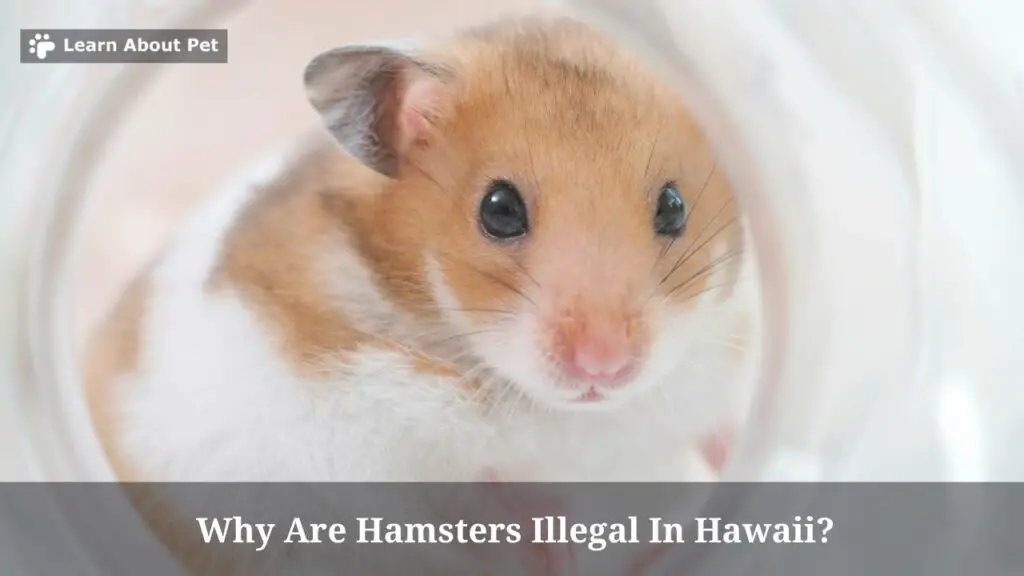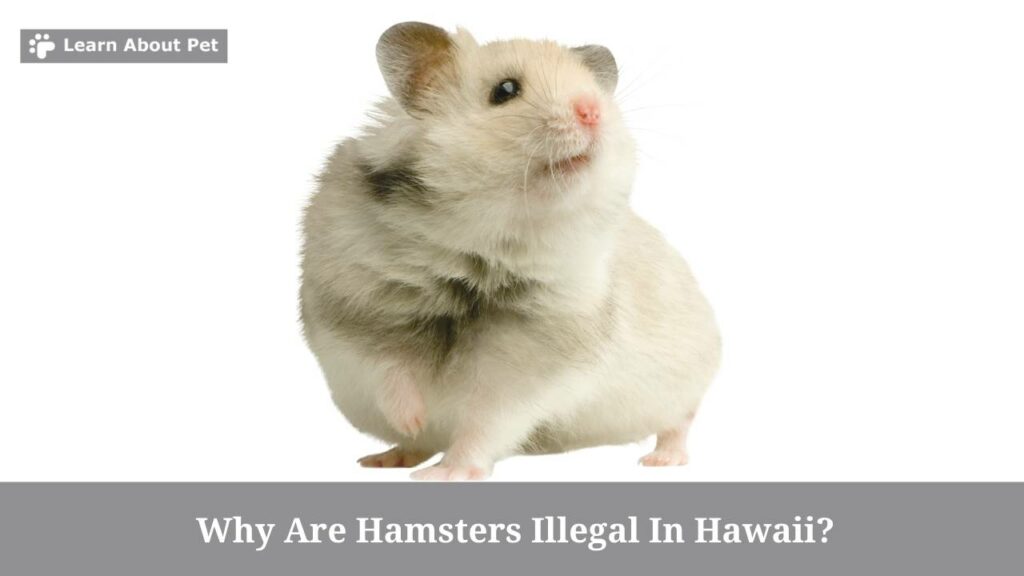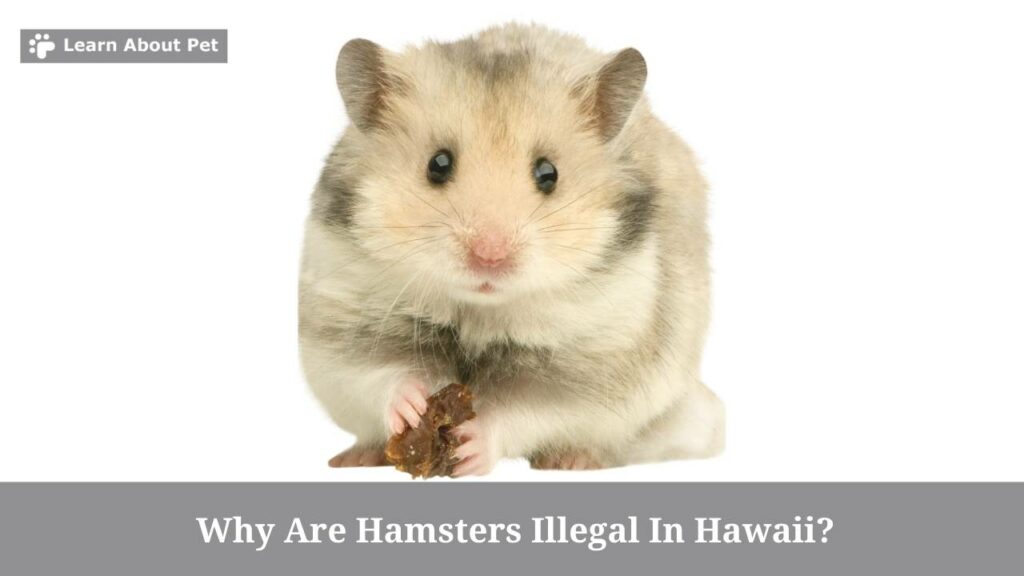Hamsters are popular with many pet lovers in various parts of the world. While hamsters are common as pets in many countries, this is not the case in the state of Hawaii. Maybe for you it feels a bit odd, because hamsters are cute animals that look harmless yet unique.
Why are hamsters illegal in Hawaii? Hamsters are illegal in Hawaii because they can make the ecosystem out of sync by becoming food for predators or eating insects that can harm native plants and wildlife. Hamsters may breed and multiply, creating large colonies when they ever escape or are abandoned by their owners.
If you are curious why Hawaii is strict with the rules for banning Hawaii as pets, read this article to the end.

Why Are Hamsters Illegal In Hawaii?
Hamsters are fast animals to breed and multiply. Many pet owners are overwhelmed when their hamsters start multiplying because hamsters can give birth monthly with more than 4 pups.
Imagine if you have a lot of hamsters and can’t take care of all of them.
Hamsters that run away from home can break up the ecosystem because they can become food for predators or harm native plants. The Hawaii ecosystem becomes unbalanced if many hamsters are into the wild.
Why Is It Illegal To Have Hamsters In Hawaii?
Hamsters that look harmless can be dangerous animals for the Hawaiian ecosystem. There are many endangered plants and wildlife in Hawaii.
It can damage the environment if uncontrolled and unchecked if any non-native species appears in the wild. Hamsters can damage corps and threaten any wildlife.
Hamsters can be comfortable living in the Hawaiian climate because the department of environmental and agricultural in Hawaii are similar to hamsters’ natural habitat.
It will make your hamster comfortable even if running away from home is like starting a new life.
What Law Bans Hamsters In Hawaii?
You can check chapters 4-71 in Hawaii Administrative Rules. The law states the Cricetidae family, which is a hamster, are banned along with other amphibians and mammals.
You can only own rodent species for scientific research and must have a valid permit.
Species that are allowed for scientific research include gerbils, cotton rats, hamsters, and Chinese mice. It is strict with a valid permit and cannot be owned as domesticated pets.
If you insist on having a hamster on purpose, you could be subject to appropriate punishment.
Why Are Hamsters Banned In Hawaii And California?
California and Hawaii have suitable environments for hamsters. If a pet hamster escapes into the wild, it will try to survive.
Because hamsters know that as prey they will be hunted by predators, the way hamsters procreate is to maintain the population.
If their population is large and uncontrolled, they will eat a lot of endangered plants or common plants and damage the ecosystem.
It’s a hard choice to eradicate where hamsters nest in the wild because they are animals that give birth quickly.
Why Are Hamsters Illegal In California?
Hamsters can live in California in hot and dry conditions, just like hamsters’ natural habitat in deserts. Hamsters are animals that are easy to prey on. They will overcome it by multiplying quickly so that their population increases.
Imagine if you saw a pair of pet hamsters running away in search of a new nest. In just 2 months you can expect more than 10 hamster newborns who need to eat every day.
If they live in a place with many endangered plants in California, the ecosystem will only get worse.
Owning a hamster, selling, or importing hamsters is illegal, and you could face prosecution if you are caught having a hamster in your home.
Not only fines, but you can also get a prison sentence if you repeat the same mistakes.
Why Are Hamsters And Gerbils Illegal In Hawaii?
Gerbils and hamsters are rodents that survive by increasing their population. If any gerbils or hamsters escape and escape into the wild, they will multiply in a short time and can damage the ecosystem shortly.
If someone is owning, importing, or selling any hamster species, they can be subject to the following penalties, such as fines up to $10,000 and need to pay for storage, removal, and care or destruction of the hamster.
If they keep repeating the mistake, the owner can get a 6-month jail sentence.
Why are hamsters illegal in Hawaii? Many endangered plants are protected in Hawaii, and there should be no non-native species that have the potential to damage plants or other wildlife.
Gerbils also have the same potential to damage many seeds and grasses for their feeding needs. Before entering winter, they will be foraging for more food.

Are Hamsters Banned In Hawaii?
Yes, hamsters are banned in Hawaii. Hamsters are not considered harmless animals because they can multiply rapidly and become an invasive species in Hawaii.
Hamsters can cause untold damage if they continue to grow and are not controlled.
There is no other reason why hamsters are illegal. Hawaii takes care of native species such as plants and wildlife to create sync in the ecosystem.
Hamsters can’t keep that up because they need a lot of food as their population grows rapidly and brings severe damage to endangered plants in Hawaii.
The environmental and agricultural officials fear those pet hamsters will leave their owners and create large wild hamsters. It doesn’t take long for hamsters to make colonies, and it will harm the ecosystem.
Why Are Hamsters Illegal To Own In Hawaii?
Each pet owner can take care of the pets they have. When their pets start to multiply and get out of control, owners will have the choice to sell them to someone else or release them to the wild.
If in Hawaii there are a lot of irresponsible hamster owners who let a lot of hamsters run away from home, it only takes a minute for the hamster to make new colonies and live in the wild.
The problem starts with the pet hamster running away and continuing to live alone in the wild. Hamster babies can overrun the ecosystem and cause untold damage to the environment.
What Pet Is Illegal In Hawaii?
The department of agriculture has a list of animals that are not allowed to be kept as pets to maintain the ecosystem in Hawaii. Let’s take a look at the table below.
| List of prohibited animals as pet | Examples |
| Undomesticated and hybrid dogs | Dingoes, wolf-dog crossbreed |
| Undomesticated and hybrid cats | Savannahs, Bengals |
| Undomesticated rabbit | Hares |
| Undomesticated swine | Wild boars |
| All ferrets | All types |
| All hamsters | All types |
| All gerbils | All types |
| All snakes | All types |
| Some birds | Toucans, parrots, and parakeets |
| Some lizards | Bearded dragon lizards, gila monsters, geckos |
Will Hamsters Ever Be Legal In Hawaii?
Hawaii considers hamsters to be too big of a risk as an invasive species and will not replace pet laws to balance the ecosystem.
Hawaii continues to focus on tightening the animal laws and never relaxing them. You will never expect Hawaii to let you have a hamster by any means.
Final Verdict – Why Are Hamsters Illegal In Hawaii
Hamsters are one of the most popular rodents to have as pets. Although hamsters look harmless, hamsters cannot be kept as pets in Hawaii. The reason why hamsters are banned as pets in Hawaii is to protect the ecosystem.

The hamster can multiply quickly and cause untold damage if a hamster is released by irresponsible owners or escapes from the cage.
In Hawaii, there are many endangered plants and wildlife that can disrupt the ecosystem because hamsters can multiply the population quickly. Hawaii does not allow people to own, sell, or import hamsters.
As a pet lover, make sure to learn about pet more and give your pet hamster a good and comfortable life!

Welcome to Learn About Pet. My name is Rajkumar Ravichandran and I love all pets, travel, and amazing food. I write about my passion and personal experience caring for multiple pets in this blog! ❤️
Post Disclaimer
DISCLAIMER: THIS BLOG OR WEBSITE, "Learn About Pet", DOES NOT PROVIDE YOU WITH MEDICAL ADVICE AND IS NOT A SUBSTITUTE FOR MEDICAL ADVICE. ALWAYS GET IN TOUCH WITH YOUR PERSONAL VETERINARIAN AND USE INFORMATION HERE AS GENERAL ADVICE.
The information, including but not limited to, text, graphics, images and other material contained on this website are for informational purposes only. No material on this site is intended to be a substitute for professional veterinary advice, food recommendation, diagnosis, or treatment. Always seek the advice of your veterinarian or other qualified health care provider with any questions you may have regarding a medical condition or for pet food related questions.







